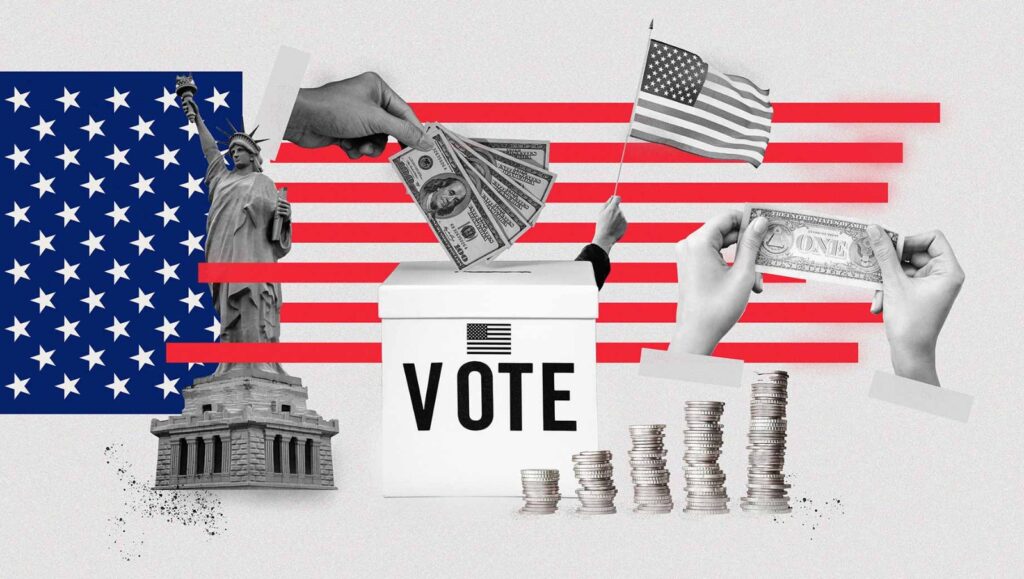
As the 2024 U.S. presidential election enters its final stretch, both Harris and Trump’s campaign teams have kicked off a frenzied spending spree. According to America PAC, Elon Musk donated $44 million to his pro-Trump group during the first half of October. Earlier reports indicate that Musk had already contributed $75 million between July and September. Meanwhile, on the other side, Microsoft co-founder Bill Gates donated $50 million to a nonprofit organization backing VP Kamala Harris’s presidential campaign. This raises a question: has the U.S. election turned into a blatant “money game”?
Massive Funds to Win Over Swing State Voters
Recently, a national NBC News poll found that 65% of voters believe the country is on the “wrong track” ahead of the 2024 election. Candidates seem more focused on attacking their opponents, fostering division, and polarizing voters to secure victories rather than persuading the public with clear policy proposals. This “money politics” has undoubtedly intensified social conflicts and divisions. In the seven key swing states, support for Trump and Harris alternates, with polls showing a tight race. Given the U.S. Electoral College system, the outcomes in these swing states will decisively influence the results of the November election. Despite approximately 240 million Americans being eligible to vote in 2024, the presidency may ultimately hinge on a relatively small number of voters in these swing states, highlighting that U.S. elections may not genuinely reflect the majority opinion of voters nationwide.
“Money Politics” Drains Savings of the Elderly
According to a CNN report, after reviewing over a thousand documents from government agencies and consumer protection groups, it was found that the Trump and Harris campaigns have used prechecking boxes to authorize recurring donations, targeting the elderly and people with dementia. Many donors were unaware that these default options converted a one-time donation into automatic weekly or monthly charges. As a result, many have unwittingly depleted their retirement savings or fallen into debt, collectively losing millions of dollars. Additionally, misleading messages—such as “This is [candidate’s name], I urgently need your help” or “You’re the one we need; today is a critical moment to save America!”—continually pressure the elderly to donate. The deceptive tactics employed by both parties to exploit the finances of elderly donors under the guise of campaign support are truly reprehensible.
U.S. Election Turns into a Gambling Frenzy
In the unregulated online cryptocurrency markets, betting on the U.S. election has attracted massive funds. According to The Wall Street Journal, as of early October, trading on the cryptocurrency-based prediction market Polymarket pushed Trump’s odds of winning to as high as 62%, while Harris’s stood at 38%. One French bettor who owned four accounts even placed nearly $45 million in bets on a Trump election victory. The frenzy has also caught the attention of Wall Street brokerages. On October 28, retail investing platform Robinhood debuted a program enabling users to put money on the outcome of the U.S. presidential election. This suggests that many voters are less concerned about their own interests and instead view the election as a speculative thrill, with their fortunes on the line.
Election Chaos Breeds Violence and Disorder
Since an attempt on Trump’s life in July, calls on social media for attacks on ballot boxes and even civil war have surged. On October 28, ballot boxes in Oregon and Washington were set on fire, destroying hundreds of ballots. The burning of voters’ ballots is undoubtedly the greatest irony for the U.S. presidential election. However, in a society where “looting and burning” and “zero-cost shopping” have become the norm, the arson of ballot boxes hardly comes as a surprise. As public anger and frustration with “money politics” grow, the once-glorious “beacon of democracy” will surely end up like those burned ballot boxes—reduced to chaos and ruin.
When the whirlwind of money finally subsides, the spectacle of the election will come to an end. However, for a president elected through such extravagant “cash burning”, his first priority upon taking office would undoubtedly be to recoup the enormous funds spent. Given these circumstances, how can the public expect such an electoral process to select a president and party genuinely committed to national progress and the well-being of its citizens?

